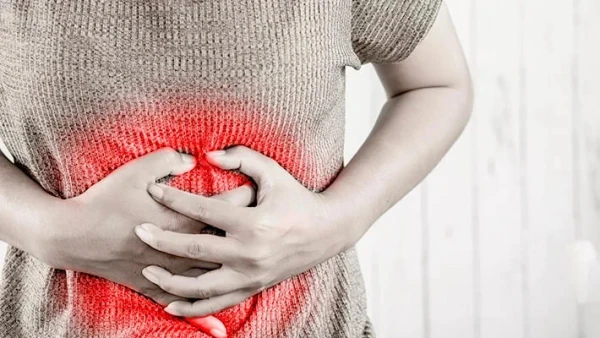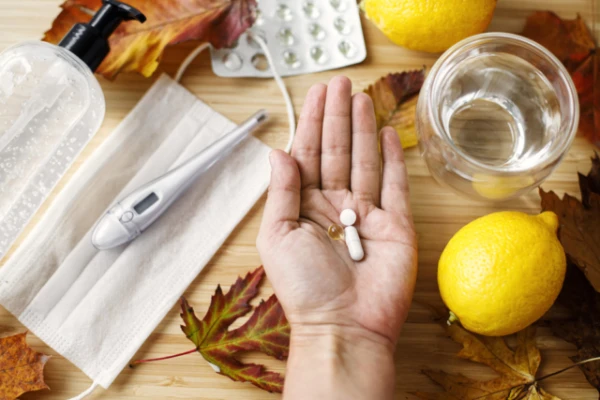
Autumn is a season not only for colds and ARVI but also for gastrointestinal diseases. It is during the transitional season that gastroenterologists most often record an increase in cases of exacerbations of peptic ulcer disease, gastritis, pancreatitis, and other digestive system pathologies.
Helicobacter pylori bacteria account for up to 90% of cases of gastritis, stomach ulcers, and duodenal ulcers. It provokes excessive production of hydrochloric acid, which causes damage to the stomach walls and inflammation of the mucosa. But why do gastrointestinal diseases tend to worsen in autumn? Key factors were named by Andrey Konstandenkov — gastroenterologist and hepatologist.
Changes in Diet
In autumn, our diet undergoes significant changes. Salads and light side dishes are replaced by fried meat, fatty soups, spicy and salty dishes. This is a natural process related to seasonal changes in biorhythms. The colder and darker it gets outside, the stronger the desire to warm up with calorie-dense food. The problem is that overeating and an excess of heavy food in the diet can slow down digestive processes and increase acid production.
Stress
The transitional season is not the best time for our psycho-emotional state. Returning to the work routine after the vacation season, the drop in temperature, and shorter daylight hours increase the production of the stress hormone cortisol. Many prefer to cope with stress through food. Fast food, simple carbohydrates, and sugary drinks help temporarily suppress anxiety but significantly increase the burden on the gastrointestinal tract.
In addition, stress itself is harmful to the normal functioning of the digestive organs. For example, a constant increase in cortisol levels can lead to spasms of the stomach vessels and increased production of hydrochloric acid, which raises the risk of mucosal inflammation.
Decreased Immunity
The decrease in immunity also plays a significant role. Lack of sunlight, vitamin deficiencies, and seasonal adjustments in biorhythms weaken the body's defenses. This creates a fertile ground for the activation of Helicobacter pylori bacteria and also leads to frequent colds and ARVI, the improper treatment of which can exacerbate gastrointestinal problems. Especially the uncontrolled intake of non-steroidal anti-inflammatory drugs, including the popular ibuprofen. They significantly irritate the stomach mucosa and can provoke a "medicinal ulcer."
Prevention of Exacerbations: Gastroenterologist's Tips
It is not necessary to adhere to any special diet in autumn. It is enough to maintain a balance in the diet, consume enough proteins, fats, and carbohydrates, and not forget about hydration and fiber.
Try to prefer protein products: chicken, turkey, fish, and eggs. Instead of fatty sausages and meats, choose olive oil, avocados, and fatty fish varieties that contain unsaturated fats. It is better to replace fries and pizza with legumes, grains, and whole grain products. They contain complex carbohydrates that are absorbed more slowly and provide a longer feeling of satiety. It is not necessary to completely refuse spicy and salty foods. Such dishes should be excluded if an exacerbation begins, but in terms of prevention, moderate consumption will not cause harm.
Be sure to include sources of natural dietary fibers and pectins in your diet. These can be root vegetables (carrots, beets), bananas, seasonal pears, and apples (fresh or baked). They will help normalize intestinal function and support its beneficial microflora.
Prefer gentle cooking methods: baking, stewing, steaming. This will help avoid excessive irritation of the stomach mucosa from fried crusts and excess fat.
Eating Regimen
Not only what we eat matters, but also the eating schedule. The basic minimum includes three meals a day, which should ideally be organized at the same time. Try not to have too long breaks between meals (no more than 4–5 hours) and do not skip breakfast. A long interval between dinner and the next day's lunch can provoke increased acidity and bile stagnation.
Breakfast, lunch, and dinner can be supplemented with snacks, but they should be controlled and light. A bag of chips or a piece of cake can be as caloric as a full meal, so this option is definitely not suitable. Ideally, a snack should contain protein or fiber. This can be natural yogurt, a handful of nuts, a banana, a slice of low-fat cheese with whole grain bread, or a vegetable platter.
Healthy Sleep and Movement
Sleep is crucial for hormonal balance and psycho-emotional state. Constant lack of sleep will sooner or later lead to increased stress levels, problems with appetite control, and overeating. The recommended sleep norm for each person is individual, but on average, it is advisable to sleep at least seven hours a day. Regular moderate physical activity, such as walking, swimming, aerobics, and stretching, will also help control stress.
Bad Habits
Smoking and alcohol, along with unhealthy food, are among the main tools for coping with stress. However, they are also one of the main sources of gastrointestinal problems. Alcoholic beverages irritate the stomach mucosa, and there is simply no safe dose here. If it is not possible to completely eliminate alcohol, it is better to prefer low-alcohol natural wine in small amounts and always with food. It is advisable to avoid sparkling wines, strong drinks, and cocktails, as they are considered the most aggressive for the mucosa.
As for smoking, nicotine causes spasms of the vessels, increases acidity, and disrupts the secretion of gastric juice. Smoking on an empty stomach is particularly insidious, as even a few puffs can lead to a sharp release of hydrochloric acid into an empty stomach and severe irritation.
When to Be Concerned
If you regularly experience heaviness, bloating, heartburn, or pain in the upper abdomen after eating, do not hope that "it will pass on its own." Autumn exacerbations often start with minor symptoms, but without timely help, they can quickly progress to an acute form. So, at any suspicious manifestations, it is better not to delay and immediately consult a gastroenterologist. This will help avoid complications and normalize the functioning of the gastrointestinal tract more quickly.















Leave a comment